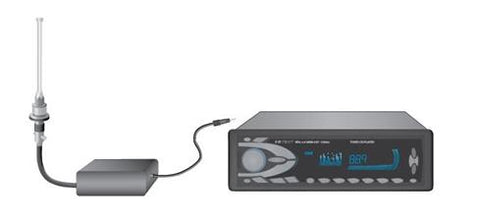Why Car Radio Static?
Anything that can generate an electric field will cause unnecessary static electricity to your car radio. The components in the sound system, the alternator and the windshield wiper motor generate varying degrees and types of noise and static electricity. Therefore, although the source of almost any type of the car radio static can be solved, it usually takes a lot of work to locate the problem and fix it.

Tracking Down the Source of Static and Noise
To find the source of the car radio static or noise, the first step is to determine whether it is the head unit, accessory (such as a built-in CD player) or an external accessory (such as the iPhone). Turn on the head unit and you can hear the annoying noise.
When the noise only occurs when the engine starts and changes with the engine speed, the problem may be related to the alternator. The hum of this kind of car horn can usually be solved by installing a sound filter. If noise is present regardless of whether the engine is running or not, then pay attention to any audio sources related to the noise. Then continue troubleshooting.
Fixing AM/FM Car Radio Static
If you only hear the car radio static or noise while listening to AM/FM radio, and not when listening to CDs or any auxiliary audio source, the problem is either the antenna, tuner, or external interference source. In order to determine the source of interference, it is necessary to disassemble the head unit, reposition the antenna line, and perform other related operations.
Fixing Other Sources of Car Radio Static
If static electricity occurs when you plug in an auxiliary audio source, such as an iPod or satellite radio tuner, but no static electricity occurs when you listen to the radio or CD player, then the problem should be the ground loop. If this is the case, find the source of the ground loop and fix it. Installing a ground loop isolator may be an easier way to solve this problem.
In other cases, you may find that whatever audio source you choose, what you hear is static. If you hear noise while listening to the radio, CD player, and auxiliary audio source, it may still be the ground loop problem, or the noise may be introduced elsewhere in the system. If your car has an amplifier, it may also be a noise source.

Ruling Out the Amplifier
To determine whether the noise comes from the amplifier, you can check by disconnecting the wiring from the amplifier's input. If the noise disappears, reconnect to the amplifier and disconnect them from the head unit. If the noise comes back, check how they are routed.

If the patch cable is close to the power wire, re-wire it may be will solve the problem. If the wiring is correct, replacing the patch cable with a higher quality and better shielding effect may solve the problem. If not, a ground loop isolator may be effective.
If you hear noise when the amplifier input is disconnected from the wiring, please check the amplifier. If any part of the amplifier is in contact with exposed metal, relocate it or install it on a non-conductive pad made of wood or rubber.
If this does not solve the problem, or the amplifier does not touch the vehicle frame or chassis, check the ground wire of the amplifier. It should be less than two feet long and tightly connected to the ground on the chassis. If not, install an appropriate length of ground wire and connect it to a good ground wire.
If this does not solve the problem or the ground is a good start, there may be a problem with the amplifier.